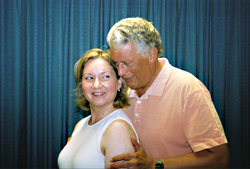It’s not often you’ll encounter an opera set consisting of an Adirondack chair, a picnic table with a small but garish Fourth of July centerpiece, and a pool of blue silk on the floor—unless perhaps it’s some updated Così fan tutte set in the Hamptons. But Black Water, with music by John Duffy and a libretto by Joyce Carol Oates adapted from her novella, explores just this sort of quintessentially American privileged- class milieu, the intersection of politics (preferably tainted), money (old), and sex (exploitative) that you’d think would make irresistibly ripe subject matter for contemporary opera—a pointed skewering of the very class that’s traditionally supported opera.
Ah, that’s why more composers haven’t taken up the challenge. This tale of love and tragedy among polo-shirted preppies, presented by the small-scale but artistically ambitious Off-Center Opera, is based on the story of Ted Kennedy, Mary Jo Kopechne, and the infamous 1969 car accident at Chappaquiddick that he survived and she didn’t. In Black Water, the two characters, a patrician, glad-handing smoothie identified only as The Senator and a smart, idealistic young woman rechristened Kelly, meet at a summer house party and drive off together after he promises her a job in his campaign. Complicating matters is Lucius, an angry young black Republican who resents what he perceives as the sort of liberal condescension men like The Senator have built careers on—and it doesn’t help that he’s in love with Kelly. John Bumbalo, Kimberly Giordano, and Sean Miller play these three roles incisively and convincingly. (The part of Kelly is double-cast; the other singer is Karen Burlingame, who created the role at Black Water‘s 1997 Philadelphia premiere.) A handful of vividly portrayed party guests and a fine three-piece orchestra (piano, cello, and clarinet) round out the production.
Duffy is one of those rare contemporary opera composers who don’t consider ear-catching music and verbal clarity to be mutually exclusive. At least that’s my guess as to why we hear so many bland, meandering operatic scores: Composers seem to believe interesting music will get between the listener and the text, that it’ll distract us. Duffy’s score is often straightforwardly tuneful in a refreshing way; the composer doesn’t hesitate to incorporate hints of ragtime, Sousa, Broadway, or even tango (for the philandering Senator, of course). With John Adams, he has in common an ability to build up exciting, forward-moving ensembles and to effectively set brightly pulsing motor rhythms to bounce off each other. His vocal writing seems not only grateful for the voice (at least none of Off-Center’s singers sound strained) but clever and rewarding, too—most memorably as Buffy, our picnic hostess, rhapsodizes over her menu, culminating in a Queen-of-the-Night-style cadenza on the words “Häagen-Dazs.”
The second act depicts the drive and the crash pretty naturalistically, a surprising and not-quite-convincing decision. The literalness of the staging courts risibility, especially when the soprano is asked to belt out “Help me! Help me!” in full Brünnhilde mode from inside the overturned, submerged car—though the conviction of the performances minimized the risk. Writing music appropriate for these explosive and grueling events is another challenge. What’s needed here is something—anything—other than tepidly melodramatic Menotti-isms.
This is the second August that Off- Center Opera (their no-nonsense slogan: “Opera You Haven’t Heard Before”) has put on a show, as if to go head-to-head against Seattle Opera’s lavish summer productions. This year, they even mounted theirs at the Seattle Center House Theatre, a stone’s throw from McCaw Hall. More power to them!







